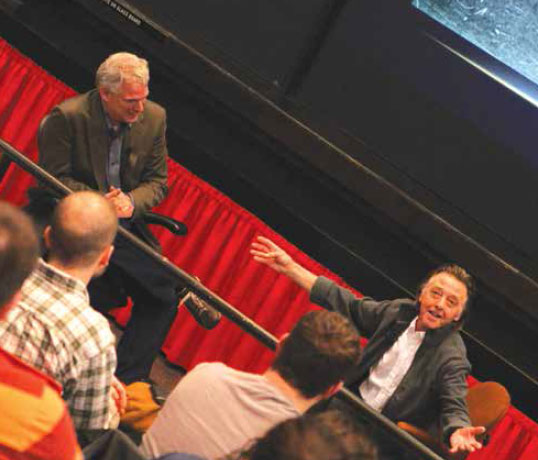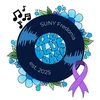
Music Industry program head Armand Petri (left) recently welcomed Joey Molland the last surviving member of the hit 1970s band, Badfinger, to speak to students about the legal and business pitfalls he experienced during his career.
What began as a niche program decades ago in the School of Music has evolved into a multi-faceted curriculum. Today’s Music Industry program in the School of Business prepares a growing number of students for a wide range of careers in the music/entertainment industry.
Currently, some 200 students are pursuing Bachelor of Science degrees in Business Administration, with a concentration in Music Industry, at SUNY Fredonia. This unique collaboration between the schools of Music and Business provides a balance of general business courses such as accounting and macroeconomics, and music courses like music theory, with specialized courses that focus on music copyright, publishing, marketing and promotion.
Armand Petri, who brings more than 25 years of experience as a producer, engineer, composer and performer, has been at the helm of Fredonia’s Music Industry program since 2000, when it enrolled just a handful of students. Mr. Petri studied Sound Recording Technology and Music at Fredonia, where his senior project band, “The Rods,” drew the attention of Arista Records and was signed by legendary label executive Clive Davis. Petri went on to earn a master’s degree in Arts Management and has worked with the Goo Goo Dolls, 10,000 Maniacs, and Sixpence None the Richer, among others. He was inducted into the Buffalo Music Hall of Fame in 2012.
“It’s a very large and growing major, due in part to Armand and his extensive industry experience,” said Russell Boisjoly, dean of the School of Business. “He has won all kinds of awards, and helped produce platinum records. He’s managed groups, produced albums, is a recording technology specialist, and done the booking, too. He’s done it all.”
Petri has crafted a program that gives students opportunities to learn about the industry in the classroom and off-campus through internships. Faculty members from the schools of Business and Music teach courses in their areas of expertise, while Petri specializes in Music Industry courses. Stuart Shapiro, who has represented musicians, recording artists, record companies and on-air media personalities in his Western New York law practice, currently teaches contract courses.
In one of the more innovative courses, students gain hands-on experience operating an independent record label and creating a music product. Marketing, business and legal affairs, public relations, promotion, sales and distribution, merchandising and artist relations are also explored.
The Music Industry Club’s extra-curricular activities are another key component. For the annual “Battle of the New Bands” competition, music marketing students pick a band and develop a strategy to create an audience for an upcoming show. Its “Life is Art” festival, held each spring and geared to the general public, features live music, comedians, poetry and other performers in the village’s Barker Commons.
In February, the program invited Joey Molland, the lone surviving member of the 1970s hit band, Badfinger, to Fredonia for a memorable performance and classroom discussions. Other recent guests include members of The Violent Femmes, The Flaming Lips, Manowar, and the CEO of video game developer Vicarious Visions, producer of the blockbuster “Guitar Hero” series.
Internships have placed students in assorted musical venues, including the Buffalo Outer Harbor Concert Series. Petri, who worked at one of those concerts this summer, described it as a Fredonia reunion.
“There were Fredonia graduates and current students. I was there to help promote it, and my students were working there,” Petri recalled. “Two were in charge of the box office and one was overseeing the ticket holders – and I was tearing tickets, working for him.”
Graduates have secured jobs throughout the industry, including clubs, record labels, concert venues and recording studios.
Petri has ambitious plans for the program, adding courses in touring and the history of the music industry this fall. He also hopes to add music and video production within the program.
“The focus is becoming more entrepreneurial, teaching students to start their own businesses rather than work for someone else,” Petri explained. The Student Record Label class is a prime example of this approach, he says, adding that it’s the most appealing feature for most incoming students.



